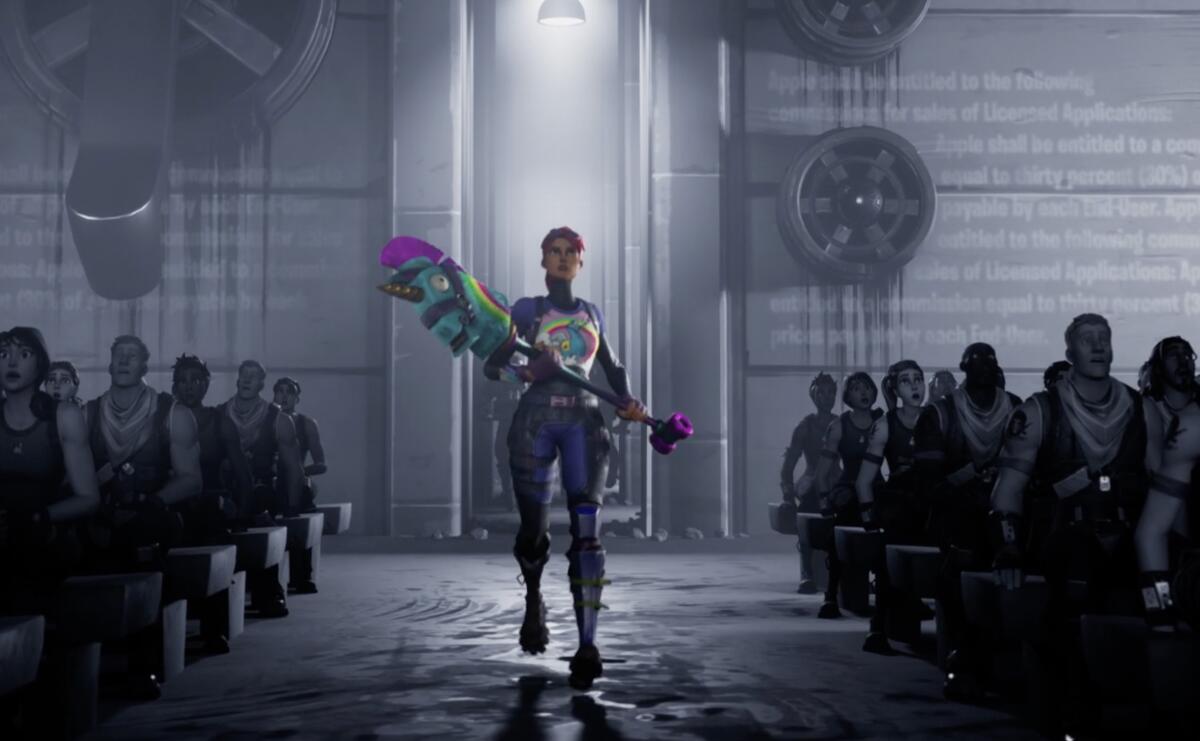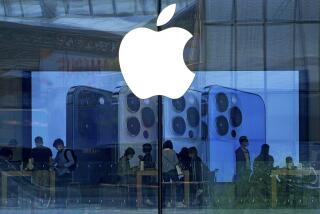Why Epic wants you fighting its #FreeFortnite war against Apple and Google

When Epic Games shook the worlds of tech and gaming last week by filing antitrust lawsuits against Apple and Google, the political undertones of its campaign to generate support for its legal action felt as obnoxious and trolling as the most egregious players of its hit game “Fortnite.”
For a company that has shied away from topicality — and in the past has awkwardly addressed the intersection of politics and gaming — its “1984”-inspired ad, a riff on an old Apple promotion, felt out of touch at best and irresponsible at worst, especially hitting as it did amid a pandemic with catastrophic effects for many Americans.
Join one mega corporation, it said to young gamers, in a crusade against other mega tech corporations. The fight began when Epic added a direct payment option to its “Fortnite” apps on iOS and Android, a violation of Apple and Google policies that Epic argues is monopolistic. In retaliation, “Fortnite” was removed from the Apple and Google Play app stores.
Getting excited about Epic’s grievances isn’t, to say the least, as inspired as a “save the USPS” rallying cry. But this is 2020 and fury is dispersed equally everywhere.
Over the weekend, Epic CEO Tim Sweeney doubled-down on the wartime rhetoric. Responding to an IGN essay that said, “Epic is choosing to weaponize fan outrage alongside its lawsuits against Apple and Google,” Sweeney appeared to deny that specific charge but still offered slogans fit for a propaganda poster. Large tech firms, he wrote on Twitter, “do not fear our weapons. They do fear our ideas.”
Apple responded louder on Monday, when Epic updated court papers and announced it was told that Apple, in addition to removing “Fortnite” from the app store, intended to terminate Epic’s access at the end of the month to Apple’s development tools. It’s a move that could drastically affect third-party developers who rely on Epic’s Unreal Engine, a powerful game development kit that fuels everything from mobile and console/PC games to television productions and even theme park rides.
Ramifications of this move are still unfolding, but it’s believed that, if enacted for any length of time, Unreal-fueled games and apps that require updates to maintain new software standards would see their functionality gradually deteriorate — or simply become inoperable.
Apple, when asked for comment, presented a modified version of its initial statement, which read, in part, “We very much want to keep the company as part of the Apple Developer Program and their apps on the [App] Store. The problem Epic has created for itself is one that can easily be remedied if they submit an update of their app that reverts it to comply with the guidelines they agreed to and which apply to all developers.”
This has the makings of a long, complicated legal battle, and it’s easy to see why Epic Games framed its beefs with Apple and Google as essentially a battle for the future of American democracy. Gamers, after all, like a good skirmish, and with the so-called “console war” days blissfully behind us, an inter-company crusade is not only good for promotion, but perhaps necessary when a company is knowingly flaunting another’s policies in an effort to call said policies into question.
But is it good for consumers? Probably not as consumer-friendly as Epic’s boosters like to claim, unless you’re in need of a real-life courtroom drama this fall.
In the world of “Fortnite” last weekend it was essentially the status quo. Yes, booting up the game will bring one to the #FreeFortnite prompt, complete with an animated clip of an evil anthropomorphic apple controlling the masses — itself a flip on the “1984” Super Bowl commercial from Apple, which positioned the maker of the new Macintosh as an insurgent fighting IBM. But mentioning the hashtag inside any of the formats of the competitive game was roundly ignored.
While high drama on social media, in the actual interactive world of “Fortnite” suction-cup grapplers still matter more than the squabbles of billionaire companies over app store rules and fees. “Fortnite” may be one of the biggest games of all time — Epic states that more than 350 million have given the game a shot — but it’s a peculiar choice in many ways as a symbol for a better tech future.
Much is made of “Fortnite’s” ability to shift to the whims of its users or, more often, its corporate partners. The game is often spoken of as a bid to become an interactive, theme park-like playground — a place where users hang, shop and play. But so far such ambitions have resulted in little more than a brand deposit. “Fortnite” can be very good to you if you have the power of Travis Scott, the NFL, Marvel or Christopher Nolan — and this year it’s become a place to creatively reveal a new song or movie trailer — but there’s nothing yet that makes it seem to be a place of discovery as opposed to an interactive billboard.
Not that it needs to be. It’s enough to be exhausted by the calls to #FreeFortnite, especially when the game remains available pretty much everywhere else other than our smartphones. Nobody’s rights are being infringed upon, but don’t completely blame Epic for making a very public stink. When it comes to gaming, public opinion matters.
The very idea of a console war, after all, was a way to divide consumers into brand partisans, arguing for or against one high-priced priced device, even though they all served as gatekeepers in keeping content and art from gaining mass adoption. Also, left unchecked, as the game industry largely has been, publishers will litter games with obstructive ads and for-purchase digital trinkets that have no real value other than fueling competitive desires.
So it’s easy to be a skeptic. Nominally, this is a battle against Apple and Google’s policies to extract 30% from user payments before passing the remainder to the developer. Epic baited Apple by allowing “Fortnite” players to make a discounted purchase directly from the battle royale game, arguing that Apple’s 30% rate is an excessive tax on developers — one, Epic says, Apple can easily levy due to the closed nature and lack of competition in its platform. Epic has made similar arguments on other platforms, using its Epic Game Store to take on Steam and build the appeal of its own services in the PC space.
Epic’s more attractive rates — sometimes free — make the company, one with a wide suite of back-end infrastructure, uniquely positioned to an on-demand lifestyle where the device or place of access becomes less important than the services and conveniences provided.
Depending on the outcome, there could be long-lasting changes to mobile purchases. It’s widely expected, for instance, that Disney+ subscribers won’t be able to purchase “Mulan” direct from their mobile device, similar to how one can’t upgrade to Spotify Premium via its app.
While Epic has already received support from the likes of Spotify, it’s worth noting that the latter is a company that today still inspires debates as to whether it benefits artists as much as labels. Lower rates from tech makers, or even the ability for companies such as Epic to circumvent app store payments, likely wouldn’t bring forth a wave of new art. If there are fees to be collected, companies — or new competing apps that act as game stores — will find a way to prevent a trickle-down windfall.
But the conversations around gaming have already begun to shift.
This is a glorious medium filled with weirdness, silliness and plenty of thoughtfulness. Apple, to its credit, has even helped along that last movement. Its Apple Arcade subscription service is a pretty good deal that’s help fund a bevy of narrative games. And yet Apple’s own relationship with games is clunky, a result of defining games as apps rather than art. (Game makers will long remember this condescending language: “We view Apps different than books or songs, which we do not curate. If you want to criticize a religion, write a book. If you want to describe sex, write a book or a song.”)
The next generation of gaming will begin to be less about consoles and home computers — they’ll still be important, of course — and more about cloud-based servers and access. Perhaps that’s why Epic hasn’t expressed much ire lately about the fees and policies from Sony, Microsoft and Nintendo — the console-playing gaming base isn’t going to grow as much as the one utilizing nontraditional devices such as smartphones.
Seen in this light, consider this is a fight for dominance in gaming’s new arena, one destined to mature over the next decade.
Epic’s lawsuit came shortly after it was reported that cloud-based gaming apps from Microsoft and Google will continue to not make their way to Apple’s App Store. No doubt this has hampered the acceptance of Google’s cloud-based service Stadia. And Microsoft’s ambitious Xbox Game Pass Ultimate is also a hopeful bid to further expand the gaming audience beyond those who invest in gaming hardware, but for now it’s not destined for Apple’s iOS devices.
In statements to media outlets such as the Verge and Business Insider, this is framed as a battle of control — Apple’s desire to curate its own platform and Microsoft’s desire to curate its own platform. But to the general consumer, this treats games in a manner contradictory to how big tech views film, television and music, creating different rules for traditional media streamers versus those who dabble in interactive content.
With the catalogs of Netflix, Disney+ and HBO Max available to stream, it’s easy to feel like games are subject to a double standard. Netflix is home to art, this distinction seems to say, whereas games are toys.
These are important, worthwhile discussions and debates, and can have an impact on gaming’s future and its cultural reputation. But it’s also easy to feel queasy about the fact they’re only now being fully challenged by a company that is in a position to quickly take advantage of their dismantling.
More to Read
The biggest entertainment stories
Get our big stories about Hollywood, film, television, music, arts, culture and more right in your inbox as soon as they publish.
You may occasionally receive promotional content from the Los Angeles Times.











